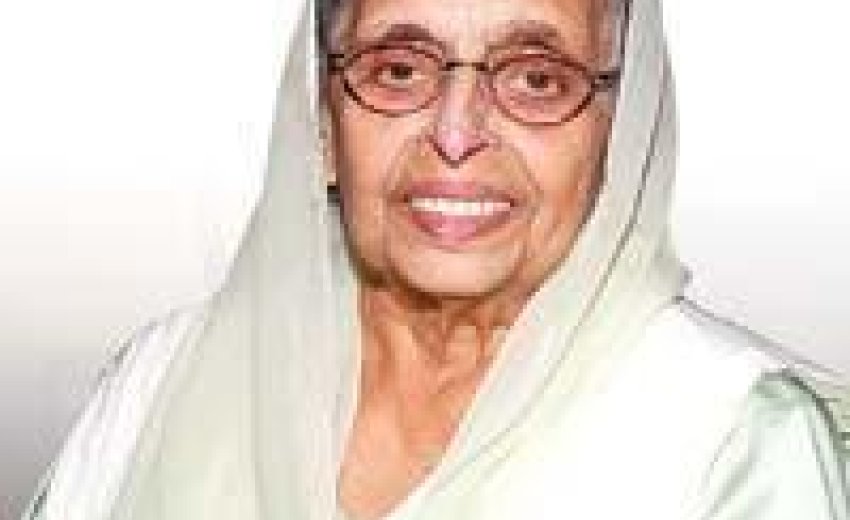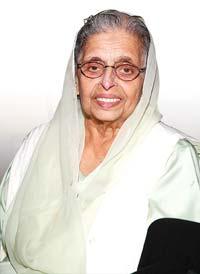|
Daljit Kaur Mann (nee Dhillon) was one of the first Sikhs born in British Columbia. She was the eldest child of Sang Singh Dhillon, an early 20th century pioneer from the North Indian state of Punjab. Singh left his homeland and came to BC to work and prosper in the lumber camps of Vancouver Island. When Daljit was born in Duncan, BC in 1924, it was only a decade removed from the infamous and racially-motivated Komagata Maru incident when nearly 400 Sikhs were turned away from landing in Vancouver. At the time very few Sikh families lived in the sparsely populated province – it would still take another 20 years before Indian immigrants would win equal access to the vote and other Canadian civil rights. Daljit and her sister Harbans, returned to India with their mother. They, along with a younger brother (Lachman, currently residing in Victoria, BC) grew up in the rural Punjabi village of Kot Phatui (District Hoshiarpur). It would be nearly thirty years later in 1952, when Daljit returned to Canada with her husband Hari Singh Mann (village Banga). They came with their first-born son Jasbir (Peter), landing first in Port Alberni and then making their way to the interior via Louis Creek and then eventually Kamloops. In the 1950’s, the BC economy was still heavily reliant on the 3F’s for economic prosperity: fishing, farming and forestry. It was in the latter by which Mann’s husband Hari would earn his living. The Mann family’s settlement in the BC Interior augured the large wave of immigrants from the Punjab who would follow in their footsteps in the 60’s and 70’s. They too would settle in similar lumber mill-towns like Williams Lake, Quesnel, and Prince George, where they would become the backbone of the forestry industry and of their communities. The family’s first home in the Kamloops area in the mid-50’s was a modest workshack in the Mission Flats industrial area, within walking distance to the now defunct Weyerhauser lumber mill where Daljit’s husband would work for 30+ years. As struggling immigrants, Daljit and her husband carved out a foundation from those humble beginnings and through bone-chilling Interior winters. She was always a fulltime stay-at-home mother with her children. What Daljit missed in the warmth of her social network and the familiarity of life back in the Punjab, she poured into raising her three sons and two daughters in her new homeland, often foregoing her own portions to ensure her children were adequately fed and nurtured. Despite numerous setbacks, Daljit and her husband Hari would always forge ahead, contributing back to their new community and creating a stable middle class household. Any limitation they experienced due to language or education was easily overcome by their virtues of hard work and saving. When her sons came of age, she arranged their marriages. All three married young women raised in India: the eldest Jasbir married Rashpaul (village Repha), the middle Jawinder married Reshmo (village Birpind) and the youngest Jaspaul married Harbinder (village Jamsher). In her latter years, ‘Biji’ as Daljit was known to her family, adored her grandmother role. Her grandchildren became spoiled at knowing her favourite breakfast of bacon and eggs or speciality dinner of ‘chicken curry’ was just a short stroll across the street to her house. Despite her advanced age, she maintained her own home and independent lifestyle to the very end. Her neighbours in Brocklehurst, where she lived for the past forty years, grew accustomed to seeing Biji regularly at work in her garden or maintaining the apple trees in her yard. ‘Biji’ was a defining symbol of the many sacrifices made by her generation of Punjabi immigrants for the gains enjoyed today by all British Columbians. But it is her common humanity and steady playful presence which will be remembered the most by those of us in her immediate family. Daljit Mann is survived by sons Peter and Paul, two daughters Surinder and Narinder, 13 grandchildren, and 10 great-granchildren. She is pre-deceased by her husband Hari Singh Mann (1992), her son Jasminder (1984) and her younger sister Harbans (1994). |

